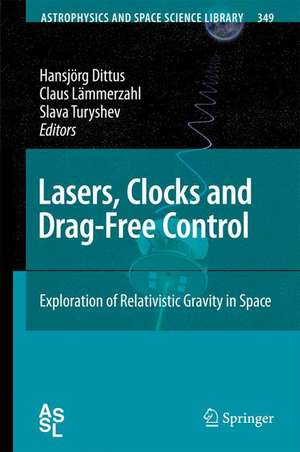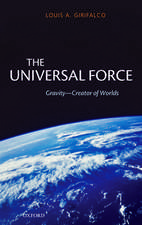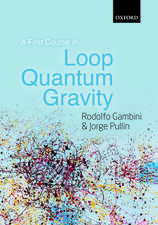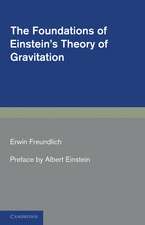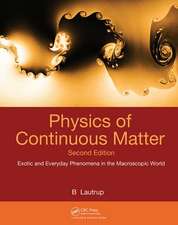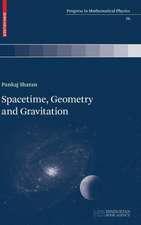Lasers, Clocks and Drag-Free Control: Exploration of Relativistic Gravity in Space: Astrophysics and Space Science Library, cartea 349
Editat de Hansjörg Dittus, Claus Lämmerzahl, Slava G. Turysheven Limba Engleză Hardback – 4 oct 2007
The purpose of the contributions in this book, written by international experts, is to explore the possibilities for the next 20 years for conducting gravitational experiments in space that would utilize both entirely new and highly improved existing capabilities.
| Toate formatele și edițiile | Preț | Express |
|---|---|---|
| Paperback (1) | 813.94 lei 38-44 zile | |
| Springer Berlin, Heidelberg – 25 noi 2010 | 813.94 lei 38-44 zile | |
| Hardback (1) | 966.27 lei 6-8 săpt. | |
| Springer Berlin, Heidelberg – 4 oct 2007 | 966.27 lei 6-8 săpt. |
Din seria Astrophysics and Space Science Library
- 24%
 Preț: 799.10 lei
Preț: 799.10 lei - 15%
 Preț: 647.92 lei
Preț: 647.92 lei - 18%
 Preț: 983.81 lei
Preț: 983.81 lei - 18%
 Preț: 790.28 lei
Preț: 790.28 lei -
 Preț: 359.86 lei
Preț: 359.86 lei -
 Preț: 389.71 lei
Preț: 389.71 lei - 20%
 Preț: 691.14 lei
Preț: 691.14 lei - 20%
 Preț: 816.18 lei
Preț: 816.18 lei - 18%
 Preț: 1011.27 lei
Preț: 1011.27 lei -
 Preț: 402.56 lei
Preț: 402.56 lei - 15%
 Preț: 664.93 lei
Preț: 664.93 lei -
 Preț: 398.15 lei
Preț: 398.15 lei - 18%
 Preț: 954.77 lei
Preț: 954.77 lei -
 Preț: 411.04 lei
Preț: 411.04 lei - 18%
 Preț: 1225.31 lei
Preț: 1225.31 lei - 18%
 Preț: 1843.29 lei
Preț: 1843.29 lei -
 Preț: 393.13 lei
Preț: 393.13 lei -
 Preț: 400.26 lei
Preț: 400.26 lei - 18%
 Preț: 953.82 lei
Preț: 953.82 lei - 18%
 Preț: 960.61 lei
Preț: 960.61 lei -
 Preț: 398.35 lei
Preț: 398.35 lei -
 Preț: 390.84 lei
Preț: 390.84 lei -
 Preț: 413.76 lei
Preț: 413.76 lei -
 Preț: 416.64 lei
Preț: 416.64 lei - 18%
 Preț: 947.67 lei
Preț: 947.67 lei -
 Preț: 404.51 lei
Preț: 404.51 lei - 18%
 Preț: 956.50 lei
Preț: 956.50 lei -
 Preț: 403.75 lei
Preț: 403.75 lei - 18%
 Preț: 1229.40 lei
Preț: 1229.40 lei - 18%
 Preț: 1224.99 lei
Preț: 1224.99 lei -
 Preț: 404.29 lei
Preț: 404.29 lei - 15%
 Preț: 654.77 lei
Preț: 654.77 lei - 18%
 Preț: 1248.20 lei
Preț: 1248.20 lei - 18%
 Preț: 955.25 lei
Preț: 955.25 lei - 18%
 Preț: 1846.28 lei
Preț: 1846.28 lei - 18%
 Preț: 1233.06 lei
Preț: 1233.06 lei - 18%
 Preț: 1234.77 lei
Preț: 1234.77 lei
Preț: 966.27 lei
Preț vechi: 1178.38 lei
-18% Nou
Puncte Express: 1449
Preț estimativ în valută:
184.89€ • 193.06$ • 152.68£
184.89€ • 193.06$ • 152.68£
Carte tipărită la comandă
Livrare economică 15-29 aprilie
Preluare comenzi: 021 569.72.76
Specificații
ISBN-13: 9783540343769
ISBN-10: 3540343768
Pagini: 670
Ilustrații: XX, 642 p. 179 illus., 3 illus. in color.
Dimensiuni: 155 x 235 x 32 mm
Greutate: 1.04 kg
Ediția:2008
Editura: Springer Berlin, Heidelberg
Colecția Springer
Seria Astrophysics and Space Science Library
Locul publicării:Berlin, Heidelberg, Germany
ISBN-10: 3540343768
Pagini: 670
Ilustrații: XX, 642 p. 179 illus., 3 illus. in color.
Dimensiuni: 155 x 235 x 32 mm
Greutate: 1.04 kg
Ediția:2008
Editura: Springer Berlin, Heidelberg
Colecția Springer
Seria Astrophysics and Space Science Library
Locul publicării:Berlin, Heidelberg, Germany
Public țintă
ResearchCuprins
Surveys.- Fundamental Physics, Space, Missions and Technologies.- General Theory of Relativity: Will It Survive the Next Decade?.- Is the Physics Within the Solar System Really Understood?.- Theory.- Propagation of Light in the Gravitational Field of Binary Systems to Quadratic Order in Newton's Gravitational Constant.- On the Radar Method in General-Relativistic Spacetimes.- A Universal Tool for Determining the Time Delay and the Frequency Shift of Light: Synge's World function.- Unified Formula for Comparison of Clock Rates and Its Applications.- Gravity Tests and the Pioneer Anomaly.- Laser Ranging Delay in the Bimetric Theory of Gravity.- Technologies.- Measurement of the Shapiro Time Delay Between Drag-Free Spacecraft.- Laser Transponders for High-Accuracy Interplanetary Laser Ranging and Time Transfer.- Unequal-Arm Interferometry and Ranging in Space.- Technology for Precision Gravity Measurements.- Clocks and Accelerometers for Space Tests of Fundamental Physics.- Atom Interferometric Inertial Sensors for Space Applications.- Drag-Free Satellite Control.- Drag-Free Control Design with Cubic Test Masses.- Solar Sail Propulsion: An Enabling Technology for Fundamental Physics Missions.- Missions and Projects.- Testing Relativity with Space Astrometry Missions.- LISA, the Laser Interferometer Space Antenna, Requires the Ultimate in Lasers, Clocks, and Drag-Free Control.- Lunar Laser Ranging Contributions to Relativity and Geodesy.- Science, Technology, and Mission Design for the Laser Astrometric Test of Relativity.- LATOR's Measured Science Parameters and Mission Configuration.- OPTIS: High-Precision Tests of Special and General Relativity in Space.- Testing Relativistic Gravity to One Part per Billion.- Exploring the Pioneer Anomaly: Concept Considerations for a Deep-Space Gravity Probe Based on Laser-Controlled Free-Flying Reference Masses.- Pioneer Anomaly: What Can We Learn from LISA?.
Notă biografică
The Editors are leading personalities in the field.
Textul de pe ultima copertă
Over the next decade the gravitational physics community will benefit from dramatic improvements in many technologies critical to testing gravity. Highly accurate deep space navigation, interplanetary laser communication, interferometry and metrology, high precision frequency standards, precise pointing and attitude control, together with drag-free technologies, will revolutionize the field of experimental gravitational physics. The centennial of the general theory of relativity in 2015 will motivate a significant number of experiments designed to test this theory with unprecedented accuracy.
The purpose of the contributions in this book, written by international experts, is to explore the possibilities for the next 20 years for conducting gravitational experiments in space that would utilize both entirely new and highly improved existing capabilities.
The purpose of the contributions in this book, written by international experts, is to explore the possibilities for the next 20 years for conducting gravitational experiments in space that would utilize both entirely new and highly improved existing capabilities.
Caracteristici
This edited volume contains a comprehensive collection of contributions presenting introduction, theory, technology, missions and projects on relativistic gravity in space Includes supplementary material: sn.pub/extras
